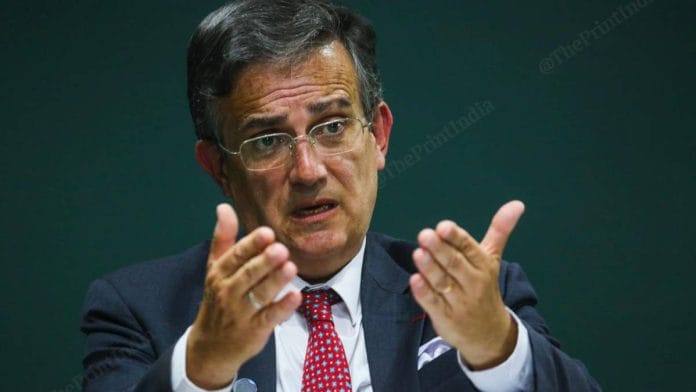New Delhi: France is keen for the Dassault Rafale fighters to be made in India, as it looks to strengthen its relationship with India based on three pillars—security and defence, partnership for the planet and people-to-people ties— French ambassador Thierry Mathou told ThePrint Wednesday.
“We already made two deals on the Rafales and we are ready to enter into a new deal. As a matter of fact, I want to specify something. When we compare our approach to that of other stakeholders in these sectors, our industry is totally in the mood of making in India,” Mathou said in discussion at ThePrint newsroom.
“Because we know it’s very important for the Indian side. So, well, it’s the case of Dassault Aviation. So, at some point, I mean, we know that in the upcoming discussion, this will be on the table. And I can tell you that we are very eager, not only to sell the Rafale, but to build the Rafale in India.”
India is keen to buy at least 114 new Rafale fighter jets and is working towards finalising the contract next year, as was reported by ThePrint. The deal would see at least 18 jets being delivered off-the-shelf in a shorter timeline with a number of parts manufactured in India.
The target is at least 60 percent indigenisation, with Dassault also building a final assembly line in India to carry out the order. ThePrint was the first to report that India is seeking to complete a government-to-government deal with France for the purchase of new Rafale fighter jets.
If the deal goes through, India will emerge as the largest operator of the Rafale fighter jets, apart from France. India already made an order for 36 Rafales in 2016 and has also ordered 26 Rafale Marine jets for the Indian Navy this year.
The French ambassador also indicated that discussions are ongoing between Safran, French aerospace and defence firm, and the Indian government for the joint designing and manufacture of the engine for Advanced Medium Combat Aircraft (AMCA). Defence Minister Rajnath Singh had made the announcement in this regard in August.
In the last decade, France has grown to become one of the largest defence equipment and armaments suppliers for India, alongside Russia. According to the Stockholm International Peace Research Institute (SIPRI), French defence equipment accounted for 33 percent of India’s total military imports between 2019 and 2023, second only to Russia’s (36 percent).
“Well, just take the share. I’m sure you are aware of that. The share of Russia in armament deals (with India) 10 or 15 years ago, and the share now, compared to what France’s was 10 or 15 years ago, and now,” Mathou said.
“It’s not only armament. It’s not only defence and security. This is why I say, it’s so important for us to involve the world, society, all components. I mean culture, universities, students. And this is our challenge,” he said.
The India-France relationship has been almost iron-clad since the two countries first announced their strategic partnership in 1998. France was one of the few western countries which chose to not impose sanctions on India following the Pokhran nuclear tests in 1998. Also, in 1976, then Prime Minister Jacques Chirac was the chief guest at India’s Republic Day parade at the height of the Emergency.
Prime Minister Narendra Modi and French President Emmanuel Macron have maintained a high-level dialogue over the years. Macron travelled to India last year as the chief guest for Republic Day, while PM Modi was in France earlier this year to co-chair the AI Action Summit.
In 2023, Modi attended the Bastille Day Parade in Paris as the Guest of Honour. Macron is further set to travel to India next year for the AI Impact Summit, which is expected to be held in New Delhi in February.
Also Read: France’s Dassault Aviation ties up with Tata for Rafale fuselage manufacturing in India
Three pillars of cooperation
For Paris, its partnership with New Delhi is focused on boosting more than just defence and security ties. While security and defence are among the three pillars of the relationship, Mathou was clear that a partnership for the planet and people-to-people connections are equally important.
“The second pillar is what we call the partnership of the planet, to face all those big issues, global challenges, climate change, protection of biodiversity, global health. Obviously, India is a major stakeholder, already a global stakeholder. And we need to engage more with India,” he said.
“And the third pillar, I tend to consider for me as ambassador here, is the biggest challenge and it’s really a top priority, (that) is people-to-people exchange. I like to say that the future of the relation between our two countries lies in the relation between our civil societies.”
In terms of the “big challenges”, India and France co-chair the International Solar Alliance (ISA) which was founded a decade ago on the margins of the Conference of Parties 21 (COP) in Paris.
The organisation, which has been active since 2018, has grown to include 125 member-states with the aim of being one of the key democratisers in the distribution of solar energy globally.
“Actually, this year we celebrated the 10th year of the Paris Agreement and of the ISA. So, this is a very good illustration. And France is still the co-chair of this organisation,” said Mathou.
However, the French ambassador pointed out that there are only 10,000 Indian students in France, and he hopes to increase this number in the next few years.
“In order to attract those students to universities and schools, we have created vehicles specifically designed for India, to come to our country, to learn the language. So, we also have schools like, I don’t know if you heard about the Polytechnic Institute in Paris, which is very popular among Indians because it’s a really high-end institution and attracts lots of students from India,” said Mathou.
(Edited by Nida Fatima Siddiqui)






